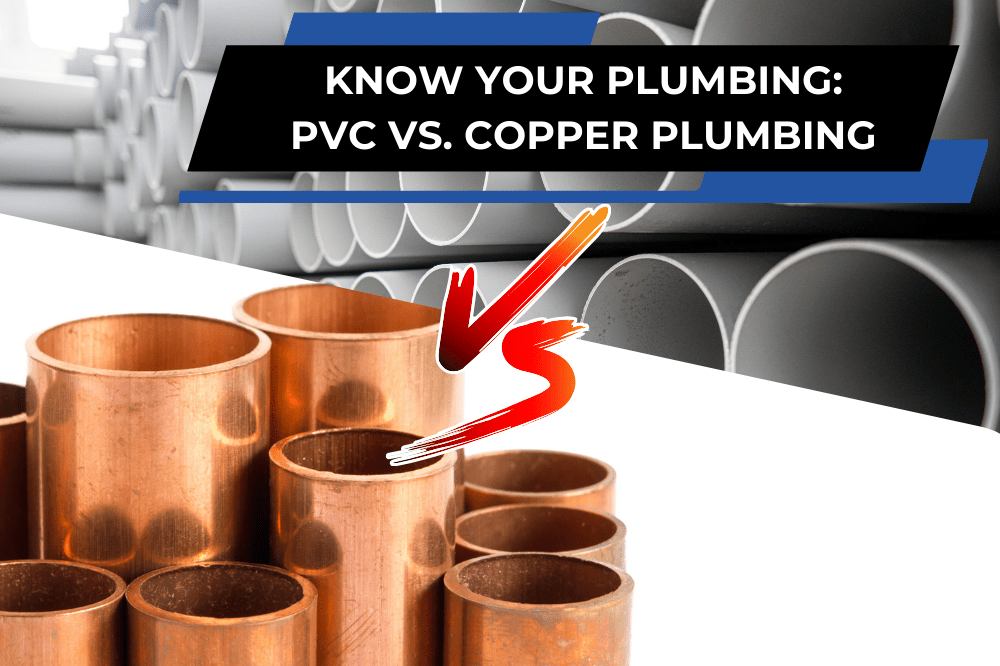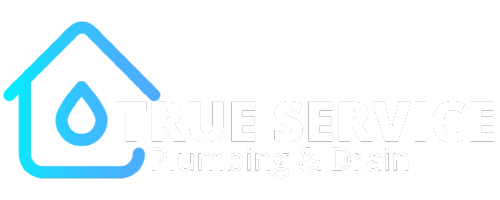When considering plumbing options for your home, one of the fundamental decisions to make is whether to opt for PVC vs copper for plumbing.
This choice can significantly impact your plumbing system’s performance, longevity, and maintenance requirements.
Let’s delve deeper into the comparison to help you make an informed decision that aligns with your needs and preferences.
Understanding PVC vs Copper for Plumbing Materials
Before we explore the differences between PVC and copper plumbing, let’s establish a clear understanding of each material.
PVC (Polyvinyl Chloride):
PVC is a synthetic plastic polymer widely used in plumbing applications. It’s favored for its affordability, versatility, and resistance to corrosion.
PVC pipes are lightweight, making them easy to handle and install, especially in areas with tight spaces.
However, it’s essential to note that PVC is not suitable for hot water applications and may degrade over time when exposed to extreme temperatures.
Copper Plumbing:
Copper has been a staple in plumbing for decades due to its durability, longevity, and resistance to high temperatures.
Copper pipes are known for their reliability and low risk of leaks. While copper plumbing is initially more expensive than PVC, it offers long-term cost savings and peace of mind.
Cost Considerations:
Cost is a significant factor for homeowners when choosing plumbing materials. Let’s break down the cost considerations between PVC and copper plumbing:
PVC Plumbing:
PVC is generally more budget-friendly than copper, making it an attractive option for homeowners looking to save on upfront expenses. Additionally, PVC pipes require fewer fittings and connectors, further reducing installation costs.
Copper Plumbing:
While copper plumbing comes with a higher initial investment, its durability and longevity can lead to cost savings over time. Copper pipes typically have a longer lifespan than PVC, reducing the need for frequent replacements or repairs.
Advantages and Disadvantages:
It’s essential to weigh the pros and cons of each material to determine which best suits your needs.
Advantages of PVC Plumbing:
- Affordability: PVC is cost-effective, making it accessible for homeowners on a budget.
- Corrosion Resistance: PVC pipes are immune to rust and corrosion, ensuring a long lifespan in most environments.
- Ease of Installation: PVC pipes are lightweight and easy to work with, reducing installation time and labor costs.
Disadvantages of PVC Plumbing:
- Temperature Limitations: PVC is not suitable for hot water applications and may warp or degrade when exposed to high temperatures.
- Longevity Concerns: While PVC pipes are durable, they may become brittle over time, especially in areas prone to freezing temperatures.
Advantages of Copper Plumbing:
- Durability: Copper pipes are incredibly durable and can withstand high pressures and temperatures.
- Longevity: Copper plumbing has a longer lifespan than PVC, reducing the need for frequent replacements.
- Heat Resistance: Copper is an excellent conductor of heat, making it ideal for hot water applications.
Disadvantages of Copper Plumbing:
- Cost: Copper plumbing comes with a higher upfront cost compared to PVC.
- Prone to Corrosion: While copper is resistant to corrosion, it may still corrode over time, especially in acidic or aggressive water conditions.
Applications and Usage:
Understanding the appropriate applications for each material is crucial for a successful plumbing system.
PVC Plumbing Applications:
- Drainage Systems: PVC pipes are commonly used for residential drainage systems due to their corrosion resistance and smooth interior surfaces.
- Irrigation: PVC pipes are ideal for outdoor irrigation systems, as they can withstand exposure to moisture and soil.
Copper Plumbing Applications:
- Water Supply Lines: Copper pipes are the preferred choice for water supply lines due to their durability and reliability.
- Indoor Plumbing: Copper plumbing is commonly used for indoor plumbing systems, including kitchens, bathrooms, and laundry rooms.
Durability and Longevity:
Durability is a key consideration when evaluating plumbing materials.
Durability of PVC Plumbing:
- PVC pipes are resistant to corrosion and chemical damage, making them suitable for most residential plumbing applications.
- However, PVC may become brittle over time, especially in areas with extreme temperature fluctuations.
Durability of Copper Plumbing:
- Copper pipes are highly durable and resistant to corrosion, ensuring a long lifespan for your plumbing system.
- With proper installation and maintenance, copper plumbing can last for decades without significant deterioration.
Environmental Impact:
Considering the environmental implications of your plumbing materials is essential for sustainability.
Environmental Impact of PVC Plumbing:
- PVC is a recyclable material, but its production process involves the release of harmful chemicals.
- Additionally, PVC pipes may emit toxic fumes if burned, posing environmental and health risks.
Environmental Impact of Copper Plumbing:
- Copper is a naturally occurring material that can be recycled indefinitely without losing its properties.
- However, copper mining and extraction processes may have environmental impacts, including habitat destruction and water pollution.
Maintenance and Repairs:
Understanding the maintenance requirements and repair considerations for each material is crucial for long-term performance.
Maintenance of PVC Plumbing:
- PVC pipes require minimal maintenance, as they are resistant to corrosion and chemical damage.
- However, periodic inspections are recommended to identify any signs of wear or degradation.
Maintenance of Copper Plumbing:
- Copper pipes may require occasional maintenance to prevent corrosion and leaks.
- Flushing the plumbing system regularly and addressing any leaks promptly can help prolong the lifespan of copper pipes.
Decision-Making Process for Homeowners:
When choosing between PVC and copper plumbing, consider the following factors:
- Budget: Determine your budget and weigh the upfront cost against long-term savings.
- Usage: Consider the intended applications for your plumbing system and choose a material that meets your needs.
- Environment: Evaluate the environmental impact of each material and choose the most sustainable option.
- Consultation: Seek advice from a professional plumber to assess your specific requirements and recommend the best solution for your home.
Conclusion
In conclusion, the choice between PVC and copper plumbing ultimately depends on your priorities, budget, and long-term goals.
Both materials offer unique advantages and disadvantages, so it’s essential to weigh your options carefully before making a decision.
Whether you prioritize affordability, durability, or environmental sustainability, there’s a plumbing solution that meets your needs.
Upgrade Your Home Plumbing with True Service Plumbing
When it comes to PVC vs. copper plumbing decisions in Toronto and the GTA, True Service Plumbing offers expert guidance and solutions for both residential and commercial properties.
Our team of licensed professionals ensures efficient installations, repairs, and replacements tailored to your specific needs.
Experiencing plumbing dilemmas? Let our experts tackle the issue with precision and expertise, restoring functionality to your plumbing system promptly.
Don’t compromise on the quality of your plumbing. Reach out to True Service Plumbing today for reliable solutions and peace of mind.
We’re here to keep your plumbing systems running smoothly.


